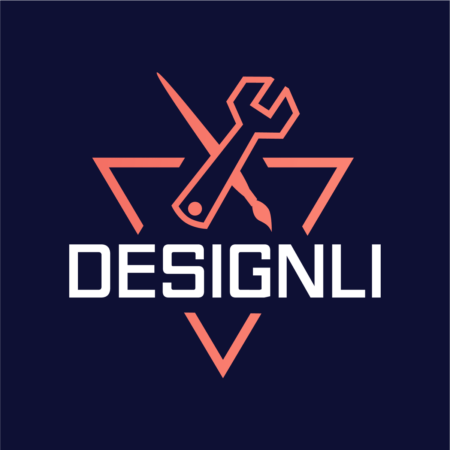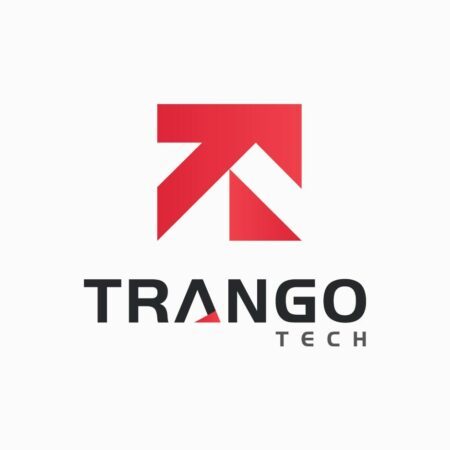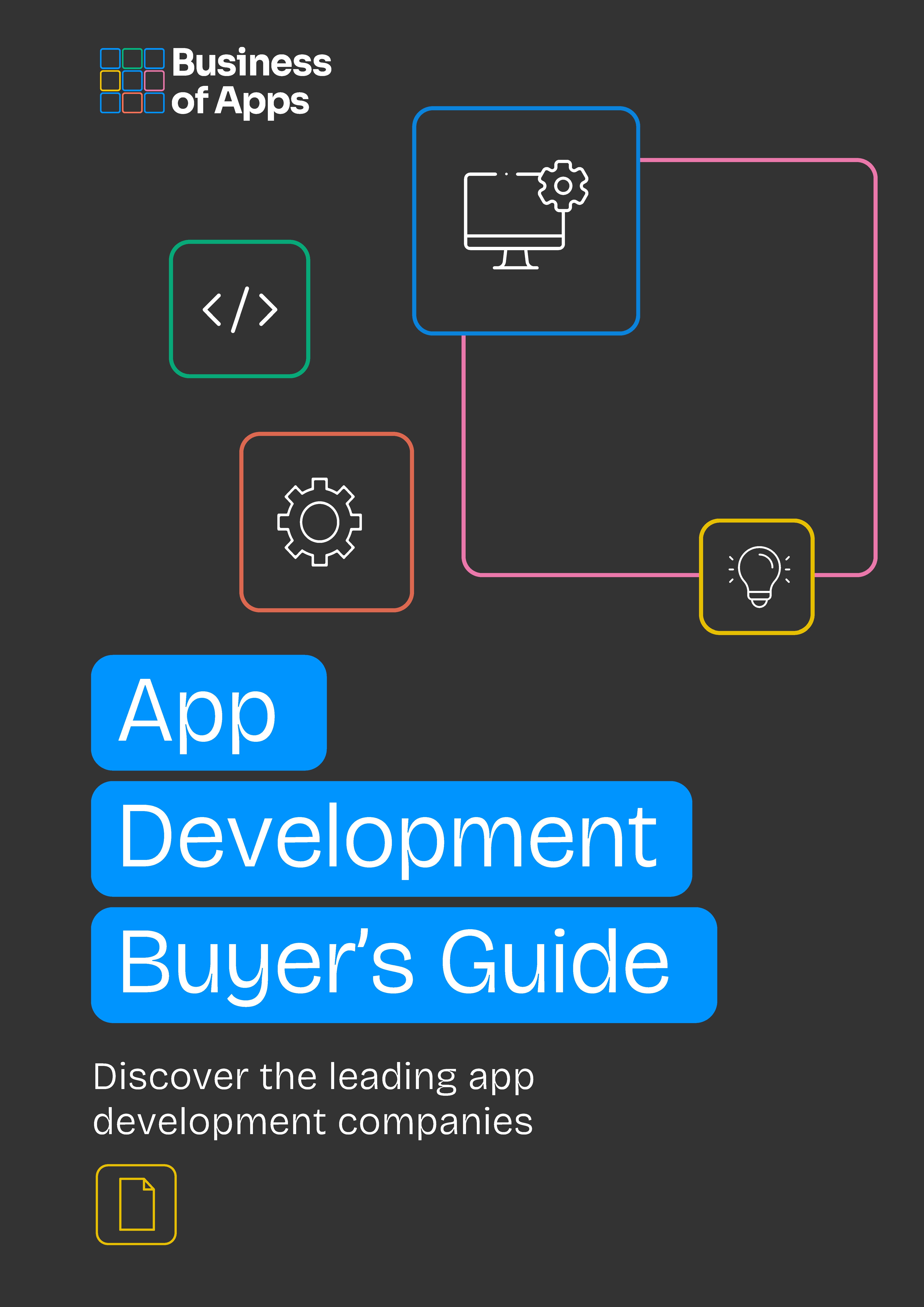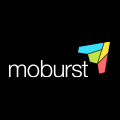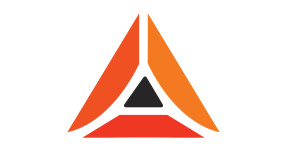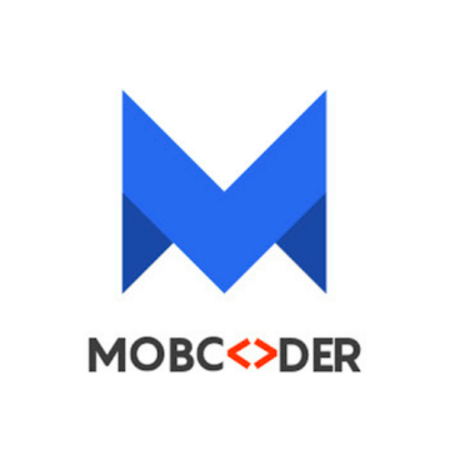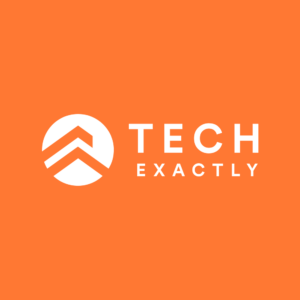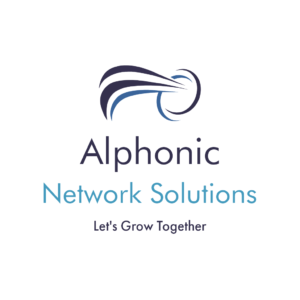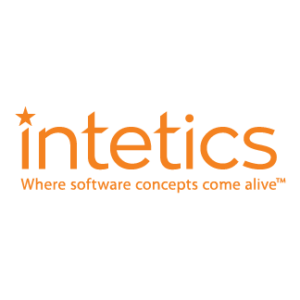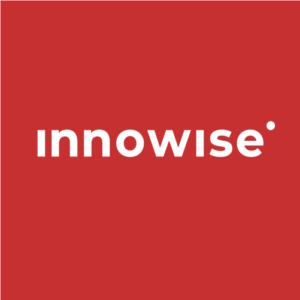This guide will cover the best virtual reality app development services, how much it costs, top app development features, and how you stand to benefit from using virtual reality app development companies.
Virtual reality (VR) apps can transport you anywhere. From computer-generated environments to the real world, VR apps offer something a bit different.
They can be used for data visualization and product interactions, too–for example, in retail, customers can view and interact with product samples in VR before deciding on their purchase.
There are a number of top VR app developers available for you to hire. In our directory, we’ve listed the best of them, allowing you to choose the right one for the job.
This guide will cover everything you need to know about virtual reality app development.
What is a virtual reality app?
A virtual reality app is a mobile app that uses the impressive power of virtual reality to alter or otherwise enhance the interactive experience.
There are many types of virtual reality apps and differing target platforms, but mobile VR apps are the primary focus of this guide.
Capable VR headsets are able to provide realistic sounds, images and other sensations and compatible mobile apps split into gaming and non-gaming variants.
Top VR App Developers
There is a plethora of exciting virtual reality apps available on both the Android and Apple app marketplaces today, so your VR app will need to provide an excellent experience to truly stand out.
The best virtual reality app developers
Virtual reality (VR) app developers are professionals who create apps and experiences that immerse users in computer-generated, interactive, 3D environments. These developers use VR tech to create simulations or virtual worlds that can be explored through specialized hardware such as VR headsets. Key headsets include the Oculus Rift, HTC Vive, and PlayStation VR.
The role of a VR app developer extends beyond just creating the visual aspects of the app; it also involves ensuring smooth interaction design, integrating motion tracking, and optimizing the app for VR hardware. These developers need expertise in 3D modelling, coding, and UI/UX design.
We’ve listed the best virtual reality app developers below.
1. Slashdev.io

Slashdev.io is an app development company that connects businesses with top-tier remote software engineers. They offer flexible freelance contracts at competitive hourly rates, enabling companies to focus on their core competencies without the extra challenges of recruiting.
Slashdev.io was approached by a prominent real estate company looking to revolutionize property viewing for potential buyers. They wanted to create a cutting-edge virtual reality (VR) experience that would allow users to explore homes remotely, offering immersive, interactive tours of properties without the need for physical visits.
The resulting app provided users with an intuitive, high-quality virtual tour of properties. Users could customize their viewing experience—such as adjusting lighting, viewing different angles, and even explore the interiors in 360-degree views. Slashdev.io’s development team ensured the app was compatible with multiple VR headsets, providing a versatile solution that could be accessed by users with varying device preferences.
Overview
Slashdev.io was founded in 2019 by Michael Ballard and Patrich Söderström. Michael Ballard is the founder and CEO, bringing a background in software entrepreneurship and a passion for helping entrepreneurs.
Patrich Söderström co-founded the company, contributing to its mission of connecting businesses with top-tier software engineers worldwide. The company primarily works with SaaS, enterprise, and software product startups.
Services
Slashdev.io provides its customers with the following services:
- Delivers high-performance VR mobile apps that boost engagement and reach
- Provides access to top-tier remote engineers to extend in-house teams
- Offers end-to-end enterprise solutions, helping businesses design, develop, and deploy scalable VR apps
2. NMG Technologies

NMG Technologies is an app development company that offers a wide range of services, including web and mobile app development, eCommerce solutions, custom software development, and digital marketing.
NMG Technologies partnered with a large manufacturing company to develop a VR app to revolutionize employee training. The company needed a solution to train new workers on complex machinery in a safe, controlled environment, without the risk of accidents or downtime.
NMG Technologies designed an immersive VR training platform that simulated real-life factory scenarios, allowing employees to practice operating machinery, handling hazardous materials, and troubleshooting equipment. The app featured interactive tutorials, real-time feedback, and the ability to simulate various emergency situations to ensure comprehensive learning experiences.
Overview
NMG Technologies serves a global client base that includes startups, SMEs, and large enterprises. The company strongly emphasizes quality, timely delivery, and customer satisfaction.
Their client base spans various industries, including healthcare, finance, retail, and education.
Services
NMG Technologies provides its customers with the following services:
- Focuses on creating user-friendly, scalable VR apps tailored to the client’s specific needs
- Custom and goal-aligned VR platform development
- Development of native and cross-platform VR mobile apps for iOS and Android
3. App Maisters

App Maisters specializes in mobile app development and digital solutions. The company is able to develop apps that meet the specific needs of larger organizations.
App Maisters has extensive experience in developing both VR and AR apps, using the immersive tech to create interactive experiences that engage users and enhance business processes.
They have worked on a range of VR and AR solutions, from mobile apps to enterprise-level applications, aimed at industries such as healthcare, education, and even oil and gas. Using VR and AR, App Maisters helps companies offer innovative services, training simulations, and data visualization solutions, improving efficiency and engagement.
Overview
App Maisters was founded in 2017 by Fahim Iqbal, the current CEO. Under Iqbal’s leadership, App Maisters has grown and established itself in the app development industry, helping companies across various sectors build innovative mobile apps.
App Maisters has worked with a variety of clients, including brands such as PepsiCo, ExxonMobil, and Shell.
Services
App Maisters provides its customers with the following services:
- Develops VR app prototypes to visualize the app before full-scale development begins
- Crafts intuitive, attractive, and functional VR apps
- Builds VR apps that work across multiple platforms
4. ELEKS

ELEKS offers a wide range of services to help businesses innovate, optimize operations, and drive digital growth across industries such as finance, healthcare, retail, and logistics.
ELEKS developed a cutting-edge VR app for a global healthcare provider to enhance the training experience for medical professionals. The goal was to create an immersive environment where doctors and nurses could practice complex procedures without the risks associated with traditional training methods.
The app integrated realistic 3D models of human anatomy and surgical tools, which could be interacted with in real-time, allowing users to perform operations and receive immediate feedback on their actions. ELEKS ensured that the app was user-friendly and customizable, allowing healthcare professionals to choose from a range of procedures and difficulty levels.
Overview
ELEKS was founded in 1991 by Oleksiy Skrypnyk. The company started as a small software development firm in Ukraine. Since then, it has grown into a global tech solutions provider.
ELEKS has worked with prominent clients across various industries, including Hewlett-Packard (HP), Deutsche Bank, The World Health Organization (WHO), and Yelp.
Services
ELEKS provides its customers with the following services:
- Analyzes target audiences, competitors, and industry trends to shape VR app features and functionalities
- Creates visually appealing and intuitive interfaces that enhance user engagement
- Ascertains key business goals and then develops a strategic plan for the VR mobile app
5. Designli

Designli is a software development firm that offers a comprehensive range of services, including UX/UI design, mobile app development, web app and cross-platform development. Their approach focuses on delivering high-quality, user-friendly solutions tailored to meet the specific needs of their clients.
Immersive Spaces is a cutting-edge VR app developed by Designli, designed to help architects, interior designers, and real estate professionals bring their projects to life in a fully interactive and immersive environment. The app allows users to step inside 3D architectural models, providing an unparalleled experience to walk through buildings, adjust lighting, and view different layouts and materials in real time.
The app has quickly gained traction in industries such as architecture, interior design, and real estate, with over 12,500 active users worldwide. The app has proven to be a powerful tool, with 94% of users reporting enhanced decision-making during the design process. On average, users spend 45 minutes per session exploring their models, with over 1,000 projects rendered and visualized.
Overview
Designli was founded in 2013 by Joshua Tucker and Keith Shields. The company is based in Greenville, South Carolina, and provides design and development services, particularly for custom mobile and web apps.
Services
Designli provides its customers with the following services:
- Offers professional design services to craft intuitive and visually appealing user interfaces for VR apps
- Helps clients define their product goals, target users, and market strategies
- Builds VR apps that work across multiple platforms, ensuring broad accessibility and functionality
6. Mobcoder Inc

Mobcoder Inc is a tech company that specializes in mobile app development and custom software solutions. The platform typically offers services such as app design, development, testing, and deployment.
CodeCraft VR is an innovative virtual reality app created by Modcoder Inc., designed to immerse users in a fully interactive coding environment. The app allows developers to write, debug, and visualize their code in a 3D space, offering a hands-on approach to programming.
With multiplayer functionality, teams of developers can collaborate on the same code simultaneously, making it a valuable tool for educational environments or collaborative development. By combining VR with software development, CodeCraft VR transforms the coding experience, offering a creative, interactive space for both learning and professional work.
Overview
Founded in 2011, the company focuses on delivering high-quality mobile and web apps, providing end-to-end development services, and helping businesses achieve their digital transformation goals.
Their clients typically span a range of industries, including healthcare, finance, education, and retail.
Services
Mobcoder Inc provides its customers with the following services:
- Offers support and updates to keep VR apps running smoothly and efficiently
- Designs intuitive and user-friendly experiences for mobile and web apps
- Creating native VR apps for iPhone and iPad
7. Trango Tech

Trango Tech is a tech services and app development company aimed at helping businesses enhance their digital presence, streamline operations, and innovate their product offerings.
Trango Tech developed The Bridge, an app to enhance communication and collaboration between churches and musicians. By integrating innovative VR technology, The Bridge offers immersive and interactive experiences, allowing users to collaborate in simulated church and music studio settings.
The app has achieved notable engagement metrics, including a fourfold increase in site traffic, an eightfold rise in calls, a 20 times growth in customer base, and a 25 times surge in downloads. These statistics underscore the app’s success in fostering a more connected and interactive community for both churches and musicians.
Overview
Trango Tech was founded in 2017. The company was established to provide innovative tech solutions, particularly in the areas of restaurant mobile app development, web development, and IT consulting.
Since its founding, Trango Tech has worked with clients across various industries to help them build custom software solutions that meet their business needs.
Services
Trango Tech provides its customers with the following services:
- Offers cloud-based solutions for data storage, scalability, VR, and infrastructure
- Provides customized VR platforms to help businesses sell products online
- Develops software that enhances enterprise-level systems and helps with automation, integration, and the management of data
Types of virtual reality apps
Examples of mobile apps that feature virtual reality support include the following:
- Healthcare apps
- Education apps
- Gaming apps
- Social apps
- Video player apps
- Employee training apps
- Travel and virtual tour apps
- Meditation apps
VR app developer example
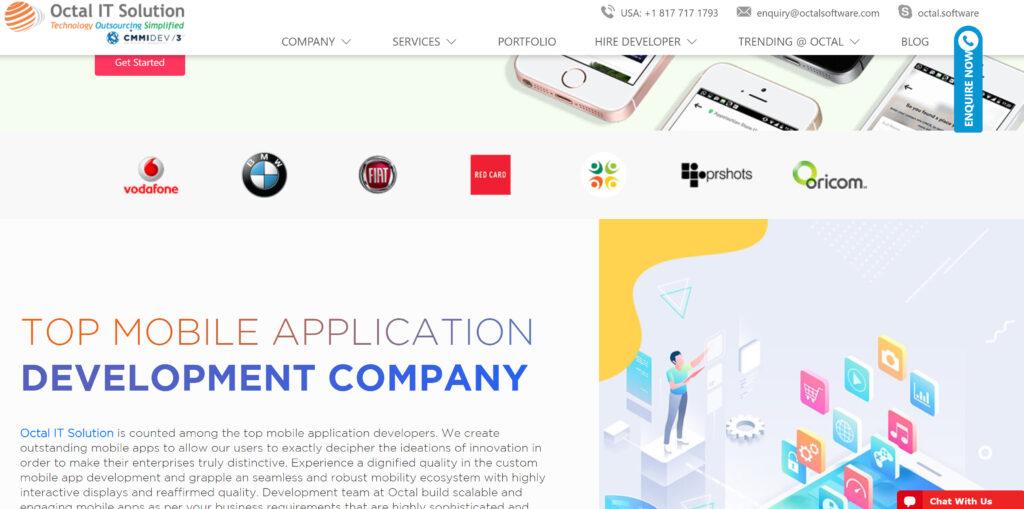 Source: Octal IT Solution
Source: Octal IT Solution
Social VR mobile apps provide user-generated worlds that double as social platforms for users.
Virtual tour VR apps are increasing in popularity and offer users the ability to learn historical and interesting facts about specific locations around the world.
App Development Buyer's Guide
Download our App Development Buyer’s Guide to get a full list of the best service providers on the market to choose from. You will also learn about types of app developers, different app development platforms, app developer locations, app development costs, how to select the right one for your business, as well as the questions to ask any of those companies you will be evaluating.
More straightforward VR apps include video players, PC streamers, web browsers, and image viewers–all of which are bolstered by the power of virtual reality.
Think carefully about your company and the type of VR app that would work best.
Why should I develop a virtual reality app?
There’s huge potential in the space for one, and VR affords companies the opportunity to create a sense of engagement and authenticity between their brand and their mobile users.
The VR industry is growing at a fast pace, too; it’s projected to increase from 6.2 billion U.S. dollars in 2019 to more than 16 billion U.S. dollars by 2022.
Virtual reality provides businesses with a chance to connect with customers with real-life products–this enables them to interact virtually with a product and assess it before they can touch it for themselves in the real world.
VR applications allow businesses to engage their customers in ways they may not have considered and tell new stories in different places altogether.
Businesses that focus on creating real-life products can also take advantage of virtual rooms.
These rooms can be used to maximize a team’s effectiveness–for example, developers, engineers, and designers can become more productive and collaborative when using VR.
VR can additionally be used for team meetings, boosting relations between members and showing stakeholders expected results inside a virtual world.
VR app developer example
 Source: Jelvix
Source: Jelvix
Ultimately, the best virtual reality mobile apps have a huge impact on customers and how they interact with products in general.
A virtual travel app, for instance, can provide users with new and exciting world experiences and enables unique advertisement and entertainment experiences at the same time.
The best VR apps inspire, educate, and enhance traditional experiences, enriching the overall product for everyone. Virtual reality is now mainstream.
What is the virtual reality app development process?
You need to develop the best VR app possible. One that loads quickly, focuses on user comfort and runs smoothly.
Building a VR app is about following a specific process that ensures nothing on a critical level gets missed during the app’s development.
An outline of the VR app development process can be found below.
1. VR strategy and research
The first step in developing a VR app is defining your strategy and direction. For instance, you can use VR technology in various creative ways, but how can you boost your overall brand awareness and make it fun for users at the same time?
Researching VR functionality beforehand is key to finding the answer, and the initial approach in your strategy lays the foundation for the next steps. For your VR app development to truly prosper, it’s all about understanding your customer’s needs first and foremost.
2. The design phase
The next step is about creating the ideal user interface. When it comes to the user experience, think about what sort of design would be suitable for the app itself–it needs to blend function with purpose.
While developing your app, the readability of text should be high, and the interface must be intuitive and make sense. Your app developer should take the necessary steps to ensure proper viewing angles and zones.
3. Asset creation
Your assets make your VR app–the user must connect and engage with it, so it needs to be immersive at all times. Creating a storyboard helps to make this possible and is especially important if your chosen app is a VR game.
Think about your visual elements and how they would translate to a 3D interface. The use of camera techniques and angles is key to success here.
4. The development phase
The VR app’s development phase combines everything from the previous steps. This stage includes the development of a working prototype before the final testing of the app.
The app development process may involve further steps after a prototype is completed, and you’ll need to create 3D simulations that allow you to test out different variables.
VR app developer example
 Source: ValueCoders
Source: ValueCoders
5. Additional testing and deployment
Once the app development finishes, the last stage is testing and deployment. It’s essential to test your VR app with simulation exercises as well as further prototype testing.
Your app developer may test the final product or the prototype several times to identify any bugs. The installation of your VR mobile app onto hardware is the final part of this stage.
6. Launching the app
Once you’re satisfied that all other stages have been completed, you’ll need to launch your mobile app.
Crucially, a mobile app’s release across the app stores requires you to prepare key metadata, including the following:
- Your app’s title
- A description
- Category
- Keywords
- Launch icon
- Screenshots for the chosen app store
From there, the VR app will need to be continually updated to ensure it meets users’ needs.
VR app development guide
Virtual reality apps are driving revenue and will be a critical industry for mobile apps, so you’ll need the best developers for the job. You can find our app developer guide here.
Key platforms for VR apps include the Oculus Rift, HTC Vive, and Sony’s PlayStation VR.
Virtual reality app development best practices and features
Here are some of the main aspects to consider when developing a VR app, including best practices as well as essential and advanced features.
Think carefully about your VR app idea
You need to think carefully about the type of experience you want to design. When you’re in an immersive 360 space, what you can do is close to limitless. That said, you need to nail down the basics before jumping in too quickly.
For example, do you want to create a first-person game or an educational VR app? Whatever you decide, start simple, take it slow, and go from there.
Don’t complicate your UI
VR apps need intuitive user interfaces. Outside-of-the-box interactions are fun to come up with, but they increase the user’s learning curve and can turn people off.
VR designers use size, contrast and colour to denote the overall hierarchy in your app. In virtual reality, size is based on the distance between the user and a piece of content–keep that in mind.
VR app developer example
 Source: Mutual Mobile
Source: Mutual Mobile
User comfort is critical
Most of us have experienced the strange sensation that comes from putting on a VR headset for the first time; it can be off-putting, to say the least.
Designing an experience that’s comfortable for people is the most important consideration for your mobile app overall. If you plan to have a lot of movement in your app, ensure that users can directly control it.
Essential features
Your VR app will need to offer a lineup of essential features.
The MVP is the minimum standard to showcase your product to your target audience, and the features must meet the most essential functions of VR apps.
These are some of the key features your mobile app needs to have:
1. High level of comfort
2. Push notifications
3. Compatible with different platforms
4. Fast-loading content
5. Location-based services
6. Intuitive UI
7. 360-degree video functionality
8. Easy to locate exit button
9. Transcoding feature
10. Secure VR assets
Focus on app features that provide the greatest value to your customers. Gather feedback, let users tell you what features make sense to them, and then implement the changes when possible.
VR app developer example
 Source: Indiespring
Source: Indiespring
Advanced features
Advanced features are optional, but they allow your app to offer value to users. Advanced VR app features include the following:
1. NFC
2. AR
3. Voice input
4. Spatial audio
5. Geo-tracking
6. Monoscopic and stereoscopic video
7. AI support
8. Chatbots
9. Smart data
10. IoT integration
Of course, the more advanced features you add, the higher the cost of the mobile VR app’s development. When deciding your budget, be sure to keep track of your overall costs.
How much does it cost to develop a virtual reality mobile app?
Development costs of VR apps vary. Below are the average estimates, as well as a few other things to keep in mind:
- VR mobile apps cost between $30,000 and $150,000 to develop
- The cost largely depends on the size and complexity of the mobile app
- A simple VR app takes about 3 to 5 weeks to develop on average
- VR apps of medium complexity will require 4 to 6 months of development
Depending on your business, you’ll need to have access to a few different teams that can assist you during the VR app development process. Developing a cross-platform mobile app that targets both platforms with a shared codebase is economical and highly recommended.
The good news is that it’s a flexible model where you can adjust the budget according to your need. That said, it’s best to contact a VR app development company for an estimate before doing anything else.
Number of VR users
Here’s the number of VR users going up to 2021, both with a headset and without one, as shown in the table below.
| Year | VR Users (no headset) | VR Users (headset) |
| 2017 | 11.5 million | 11 million |
| 2018 | 19 million | 15.7 million |
| 2019 | 23.3 million | 19.6 million |
| 2020 | 27.9 million | 23.9 million |
| 2021 | 30.6 million | 26.5 million |
Source: eMarketer
As you can see, there are few signs the industry is slowing down.
How can I benefit from virtual reality app development services?
Partnering with virtual reality app development companies allows you to create apps that enable customers to connect with you on a completely new level.
These expert app developers let you take advantage of the significant opportunity available while keeping things as stress-free as possible.
Virtual reality app developers build highly-scalable apps, whether they’re your first app or tenth. These development companies create beautiful apps that use the latest VR tech while meeting expectations.
VR app developer example
 Source: Pixelfield
Source: Pixelfield
Some of the key benefits of VR app development companies include the following:
- Affordable app development costs — VR apps typically get designed using different frameworks, which allow developers to reuse the code for multiple different apps.
- Superior functionality — VR app development companies provide excellent functionality and usability with top-notch features.
- Bespoke plans — Custom VR app development plans that are designed to fit all needs and typically come with leading scalability.
- Better security — VR apps get built with increased security for your employees using the latest mobile app encryption technology.
- Efficient data management — Efficient data management solutions that protect employee and company data and help you stay compliant.
- Reliable communication — Communication at every key stage of your VR development journey.
If you’re planning to design a VR app, getting a free quote from mobile app development professionals is usually a smart move–this is especially true if you’re a beginner or just starting out.
Get started with the best virtual reality app developers
The most critical reasons for having a virtual reality app are the following:
- You can boost collaboration and productivity across projects
- You can enhance the mobile customer service
- You can increase sales and retention rates
- VR apps are cost-effective and reduce the cost of creating different prototypes
- You can provide a 3D vision of your products
- You can save time and money and reduce travel expenses
- You can simulate environments to train people and test products in real-time
- You can emerge and connect with users in new and exciting ways
There are a number of app development companies that take on virtual reality app development projects and have app developers with experience specifically catered to these apps. Here we’ve put together for you a list of the best.


